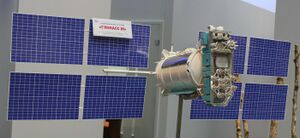Engineering:Kosmos 2514
 Glonass-M satellite model | |
| Mission type | Navigation |
|---|---|
| Operator | Russian Aerospace Defence Forces |
| COSPAR ID | 2016-008A[1] |
| SATCAT no. | 41330[1] |
| Website | GLONASS status |
| Spacecraft properties | |
| Spacecraft | GLONASS No. 751 |
| Spacecraft type | Uragan-M |
| Manufacturer | Reshetnev ISS[2] |
| Launch mass | 1,414 kilograms (3,117 lb) [2] |
| Dry mass | 250 kg[2] |
| Dimensions | 1.3 metres (4 ft 3 in) diameter [2] |
| Start of mission | |
| Launch date | February 7, 2016, 00:21 UTC |
| Rocket | Soyuz-2.1b/Fregat[2][3] |
| Launch site | Plesetsk 43/4 |
| Contractor | Russian Aerospace Defence Forces |
| Orbital parameters | |
| Reference system | Geocentric |
| Regime | Medium Earth orbit |
| Semi-major axis | 25,508 km (15,850 mi)[1] |
| Eccentricity | 0.0010[1] |
| Perigee altitude | 19,164 km (11,908 mi)[1] |
| Apogee altitude | 19,111 km (11,875 mi)[1] |
| Inclination | 64.81 degrees[1] |
| Period | 675.7 minutes[1] |
| Epoch | 12 March 2016 |
GLONASS (satellites) Kosmos (satellites) | |
Kosmos 2514 (Russian: Космос 2514 meaning Space 2514) is a Russian military satellite launched in 2016 as part of the GLONASS satellite navigation system.
This satellite is a GLONASS-M satellite, also known as Uragan-M, and is numbered Uragan-M No. 751.[3]
Kosmos 2514 was launched from Site 43/4 at Plesetsk Cosmodrome in northern Russia. A Soyuz-2-1b carrier rocket with a Fregat upper stage was used to perform the launch which took place at 00:21 UTC on 7 February 2016. The launch successfully placed the satellite into a Medium Earth orbit. It subsequently received its Kosmos designation, and the international designator 2016-008A. The United States Space Command assigned it the Satellite Catalog Number 41330.[1]
The satellite is in orbital plane 3, in orbital slot 17.[4] As of March 2016 it remains in operation.
See also
- 2016 in spaceflight
- List of Kosmos satellites (2501–2750)
- List of R-7 launches (2015–19)
References
- ↑ 1.0 1.1 1.2 1.3 1.4 1.5 1.6 1.7 1.8 "LIVE REAL TIME SATELLITE TRACKING AND PREDICTIONS: COSMOS 2514 (GLONASS)". n2yo.com. http://n2yo.com/satellite/?s=41330.
- ↑ 2.0 2.1 2.2 2.3 2.4 Anatoly Zak. "GLONASS network". RussiaSpaceWeb.com. http://www.russianspaceweb.com/uragan.html.
- ↑ 3.0 3.1 Stephen Clark (February 7, 2016). "Glonass navigation system reinforced by Soyuz launch". Spaceflight Now. http://spaceflightnow.com/2016/02/07/glonass-navigation-system-reinforced-by-soyuz-launch/.
- ↑ "GLONASS constellation status, 13.03.2016". Information-analytical centre, Korolyov, Russia. March 13, 2016. http://www.glonass-ianc.rsa.ru/en/GLONASS/.
 |
